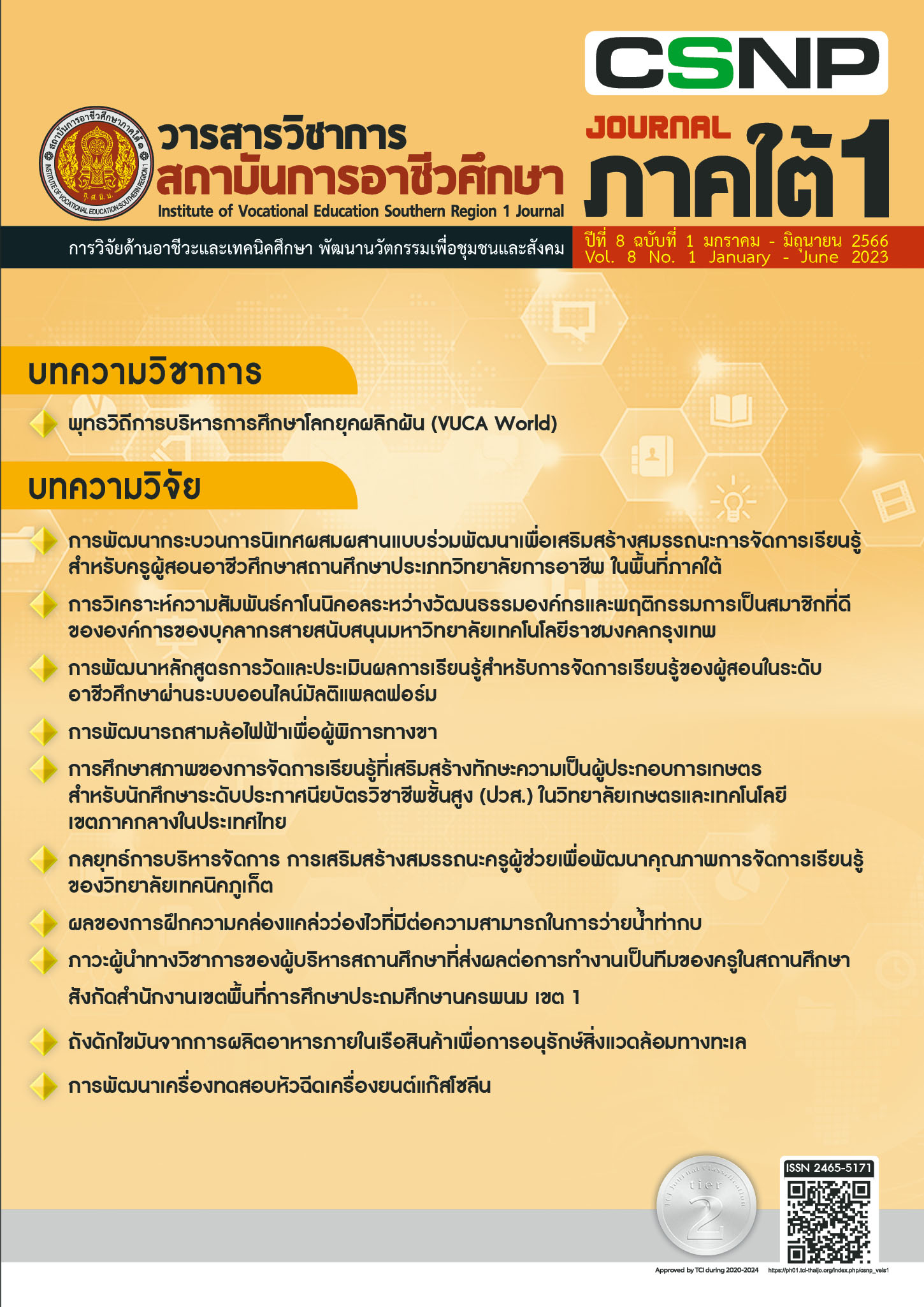Development of Learning Measurement and Evaluation Curriculum for Vocational Teachers via Multi-platform Online System
Keywords:
Measurement and Evaluation Curriculum, Online System, Multi-platformAbstract
This research aimed to develop a learning measurement and evaluation curriculum for vocational teachers via multi-platform online system with the objectives as follows: 1) to develop a learning measurement and evaluation curriculum for vocational teachers via multi-platform online system and 2) to evaluate the quality of the learning measurement and evaluation curriculum for vocational teachers via multi-platform online system. The population included teachers in a network of 14 vocational institutes in the southern region derived by a purposive sampling technique. The research tools consisted of the curriculum quality assessment form of 3 parts, i.e., an assessment of the suitability of the curriculum, an assessment of the consistency of the curriculum, and open-ended questions. The statistics included mean and standard deviation; then, the results were interpreted by comparing with the set criteria.
The results showed that: 1) the learning measurement and evaluation curriculum for vocational teachers via multi-platform online system consisted of 6 main parts, i.e., Unit 1 Concepts and Aims of Measurement and Evaluation, Unit 2 Creating a Practice Assessment Tool, Unit 3 Rubric Scoring, Unit 4 Designing a Practice Assessment, Unit 5 Auditing Quality of Practice Assessment, and Unit 6 Online Practice Assessment. 2) The results of the quality evaluation of the curriculum revealed that the overall curriculum consistency assessment was at a high level. It was found that the principles and rationale of the curriculum were consistent with the importance of curriculum development. The aspect with the highest level were the aims of the curriculum and the curriculum principles. The course suitability assessment showed a high level in overall. When considering on each aspects, the 3 most appropriate were as follows: (1) media and technology, (2) content and structure of the curriculum, and (3) design and learning process respectively. Finally, the users’ satisfaction assessment of the learning measurement and evaluation curriculum for vocational teachers via multi-platform online system on teaching and learning practice and workshop was at the highest level.
References
วิทยา วาโยว อภิรดี เจริญนุกูล ฉัตรสุดา กานกายันต์ และจรรยา คนใหญ่. (2563). การเรียนการสอนแบบออนไลน์ภายใต้สถานการณ์แพร่ระบาดของไวรัส COVID-19: แนวคิดและการประยุกต์ใช้จัดการเรียนการสอน. วารสารศูนย์อนามัยที่ 9 : วารสารส่งเสริมสุขภาพและอนามัยสิ่งแวดล้อม, 14(34), 285-298.
วิไลวัลย์ โพธิ์ทอง. (2561). เทคโนโลยีกับการเรียนรู้ตลอดชีวิตของครู. วารสารการวิจัยเพื่อพัฒนาชุมชน มหาวิทยาลัยนเรศวร, 11(2), 18-26.
ประวีนา เอี่ยมยี่สุ่น. (2560). การพัฒนาหลักสูตรฝึกอบรม เรื่อง การวัดและประเมินผล การเรียนรู้สำหรับนักศึกษาฝึกประสบการณ์วิชาชีพครู คณะศิลปศึกษา สถาบันบัณฑิตพัฒนศิลป์. วารสารวิชาการ มหาวิทยาลัยราชภัฏพระนคร, 8(1), 210-219.
สงัด อุทรานันท์. (2532). พื้นฐานและหลักการพัฒนาหลักสูตร. กรุงเทพมหานคร: เซนเตอร์พับลิคเคชั่น
Tyler, R. W. (1950). Basic Principles of Curriculum and Instruction, Syllabus for Education 360. Chicago: University of Chicago Press.
ไชยยศ ไพวิทยศิริธรรม ภัทราวดี มากมี และเขมณัฏฐ์ มิ่งศิริธรรม. (2556). การพัฒนาหลักสูตรฝึกอบรมด้านประเมินผลการเรียนรู้ระดับสูง สำหรับครูในสถานศึกษาขั้นพื้นฐาน. วารสารมนุษยศาสตร์ สังคมศาสตร์ และศิลปะ, 6(1), 448-456.
Downloads
Published
Issue
Section
License
Copyright (c) 2023 Institute of Vocational Education Southern Region 1 Journal

This work is licensed under a Creative Commons Attribution-NonCommercial-NoDerivatives 4.0 International License.



